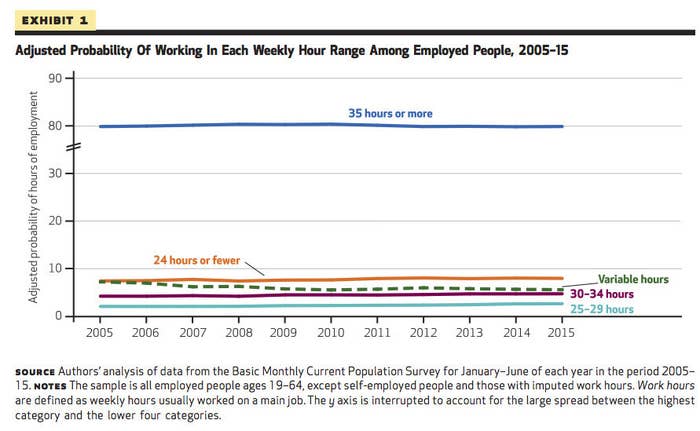
When the 2010 Affordable Care Act took effect, some policymakers worried the law would cause companies to reduce workers' hours to avoid new costs. Since the ACA mandates employers provide insurance to all "full-time" employees (those working 30 hours or more), some argued workers would likely see their hours capped at 29.
A report released today, examining data from the Current Population Survey (CPS) for 2005–15, found limited evidence this really happened.
Asako Moriya, of the Agency for Healthcare Research and Quality (AHRQ), and Professor Kosali Simon, of Indiana University School of Public and Environmental Affairs, with other authors, determined the adjusted probability of working part-time before and after the ACA's enactment did not show significant change.
"We did not see increases in 2015 in the probability of working either 25–29 hours or fewer than 25 hours per week," the authors wrote. "Moreover, the increased prevalence from 2013 to 2014 in working 25–29 hours, while significant, was small (0.18 percentage points) and reflected an upward trend that began before passage of the ACA."

The data also did not show a large reduction in 2015 (or in 2014, for that matter) in the frequency of employees working 30–34 hours, as one might expect if employers reduced hours for workers just above the 30-hour threshold.
A FiveThirtyEight analysis of the data from last January, and a separate Urban Institute report, supported the same conclusion: the ACA hasn't led to a significant number of workers being shifted from full-time employment to part-time.
But the article also noted that evidence suggests the Act "has led some employers to limit the hours of workers who were already part-time, effectively giving a pay cut to some of the most vulnerable Americans," since cuts in hours mainly hit low-wage workers.
FiveThirtyEight's Ben Casselman estimated "the health law has likely led a few hundred thousand workers to see their hours cut or capped. That’s small in the context of an economy with 150 million workers. But it isn’t a minor issue for those workers. Most of them are among the economy’s most vulnerable: low-wage, part-time workers who likely have few other options."
Worker advocates maintain this risk is real and pernicious. "It’s important to consider how erratic work schedules have blurred the line between full-time and part-time work, and also increased turnover," said Carrie Gleason, Director of the Fair Workweek Initiative. "In low wage retail and fast food industries, unpredictable schedules and high turnover make it easy for employers to avoid the health care mandate without cutting hours."
Jed Graham at Investor’s Business Daily has compiled a list of employers who have cut hours for hundreds of workers since 2012.
"There’s certainly evidence for other groups — sub-groups — where there seem to be increases in part-time work,” Professor Simon told BuzzFeed News, citing workers with only high-school level education and older employees. "But at the aggregate national level, there is no statistically significant change.”
